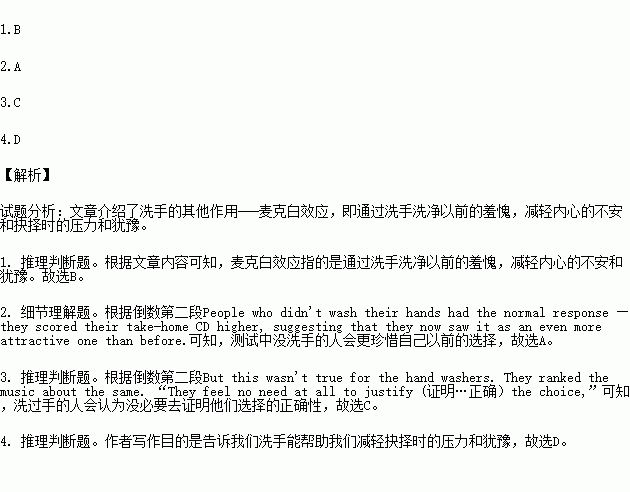题目内容
Soaping up your hands may do more than just get rid of germs. It may wash away the inner confusion you feel right after being forced to make a choice between two appealing choices, according to a new study. The study builds on the past research into a phenomenon known as “the Macbeth effect” (麦克白效应).
It turns out that Shakespeare was really onto something when he imagined Lady Macbeth trying to clean her conscience by rubbing invisible bloodstains from her hands.
A few years ago, scientists asked people to describe a past wrong act. If people were then given a chance to clean their hands, they later expressed less guilt than people who hadn't cleaned.
This finding interested W. S. Lee, a researcher. “Anything from the past, any kind of negative emotional experiences, might be washed away,” says Lee.
He decided to test hand washing's effect on one kind of bad feeling:the tension we feel after being forced to choose between two attractive choices, because picking one choice makes us feel that we've lost the other. People usually try to calm this inner conflict by later exaggerating (夸大)the positive aspects of their choice.
He had students rank 10 different music CDs. Then he offered students two of the CDs and told them to select one as a gift. Some students then used liquid soap. Others only looked at the soap or sniffed (闻)it. “Actually, you do not need water and soap,” says Lee.
Later, the students again had to rank all the music CDs. People who didn't wash their hands had the normal response — they scored their take-home CD higher, suggesting that they now saw it as an even more attractive one than before. But this wasn't true for the hand washers. They ranked the music about the same. “They feel no need at all to justify (证明…正确)the choice,” says Lee.
But the effects of it just aren't clear. Schwarz says it’s too soon to know whether people should head for a sink after making a tough choice. He says washing may help decision-makers by cleaning away mental disorder. But perhaps if they don't go through the usual post-decision process of justifying their choice, they might feel more sorrow in the long run.
1.“The Macbeth effect” refers to the fact that ______.
A. Lady Macbeth had a habit of washing hands
B. people feel less ashamed after washing their hands
C. Macbeth knew about the importance of cleaning hands
D. Shakespeare used to wash his hands before writing Macbeth
2.In Lee's experiment, those who didn't wash their hands after making a choice ________.
A. valued their choice more than before
B. felt regretful about their choice
C. wished they had washed their hands
D. didn't care about their choice
3.According to Lee, those hand washers consider justifying their choice ________.
A. scientificB. usefulC. unnecessaryD. convincing
4.What does the author intend to tell us in the passage?
A. Washing hands is a habit in our daily life.
B. Washing hands is to keep hands clean.
C. Washing hands will help you make a better choice.
D. Washing hands can reduce the stress of decision.
 阅读快车系列答案
阅读快车系列答案
